03 Aug When is sharing, caring?

Is it ever okay to share someone else’s secret without permission?
Sharing someone else’s secrets without permission can be b-b-b-bad to the bone. Doing so will likely destroy trust, credibility, and friendships. Doing so can also start rumors and gossip and hurt others.
So, when is it okay to share someone else’s secret?
Sometimes someone else’s secret raises a red flag of potential danger to that person or others. For example, if your best friend tells you that he is secretly planning to skin squirrels and hang them from the school flag pole, that might be a secret you would want to share with the right adults. You don’t have permission to share the secret, but saving the squirrels is more important—not to mention that an action like this is often a precursor (meaning, an indicator) of more trouble down the road and that the person doing these things needs help.
What if a friend were planning on doing something not-so-nice to someone else? Would it be okay to tell on him or her? Or warn the target? Maybe tell a teacher or adult? What if a friend were planning on doing something harmful to herself? And she made you promise to keep it a secret? Would sharing it betray her, or save her?
To complicate matters more, maybe by sharing that secret with you, your friend was actually asking for help. Indeed, sharing a secret can offer relief, but it can put the person receiving the information in a tough spot. The receiver can feel burdened, stressed and overwhelmed with the information. What am I to do with this? It feels too heavy for me and possibly dangerous for my friend.
Although the person who told you the heavy secret now feels better, you are left in a position to make a call as to what to do with the information if you feel that it is a potential threat or a cry for help. Do you keep it to yourself or alert someone?
What is a cry for help, anyway? The expression is used when someone doesn’t outright ask for help but is saying or doing things that are so worrisome they seem to say, “Look at me, I need help.” For example, if someone were to say something like, “Don’t tell anyone, but I’m starving myself to lose another twenty pounds even though my doctor says I’m already underweight.” That’s a cry for help. That’s when you step up to the plate and alert someone that this person is in big trouble.
Want the answer sheet on what to do? There isn’t one: there are no right answers.
You are the judge.
Figuring out what “the right thing to do” is is not easy. Book 1 of the Your Self Series program has an entire chapter, Your Morals, that deeply discusses these sorts of dilemmas. Knowing what is right for you means looking yourself in the eye and feeling good about your




Post Question:
Would you ever share your friend’s secret because it seemed more like a cry for help than a secret, even after he or she made you promise not to tell? Has this ever happened to you?
Answer the post question here
What's being said